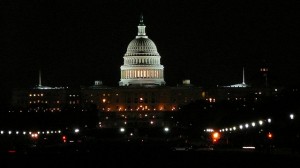Seven days into a government shutdown, and nine days away from a potentially catastrophic breach of the nation’s debt limit, and the question everyone is asking is: who will blink first?
The White House says that it absolutely will not negotiate over a debt limit hike. They see it as imperative to delegitimize the tactic of using the threat of default to squeeze policy concessions out of the majority once and for all. For the administration, this is much more than a partisan spat – they see this series of forced crises as a fundamental threat to our democratic system, an approach that has the potential to permanently alter the balance of power between the White House and Congress, and between the House and the Senate. They believe that if they give anything substantial to House Republicans in exchange for a short-term deal funding the government, we’ll just end up in the same situation a few months from now. Lurching from showdown to showdown will become a new norm in Washington, DC.
The only way to delegitimize nullification-through-brinksmanship is to force the GOP to back down without winning anything (or without winning anything more than a symbolic, face-saving concession that everyone will see as such).
On the other side, Speaker John Boehner (R-OH) can’t get his caucus to vote for anything that doesn’t win them significant policy concessions. “We’re not going to be disrespected,” Rep. Marlin Stutzman (R-IN) said last week in a much cited interview. “We have to get something out of this. And I don’t know what that even is.”
That position is being shored up by a significant bloc of GOP lawmakers in the House who represent overwhelmingly conservative districts and fear primary challenges from their right – backed by deep-pocketed outside groups that demand a hardline –if they don’t hold fast.
But it’s also been widely reported that there are enough votes in the House to pass a clean budget resolution, and presumably a clean debt limit hike, with mostly Democrats and a handful of Republican moderates. So far, John Boehner has refused to bring a bill to the floor, insisting that he will only consider legislation that has the support of most Republicans.
According to the conventional wisdom, Boehner will face a revolt from within his own ranks and lose his speakership if he folds and passes a bill with mostly Democratic votes (although Jonathan Bernstein argues that Boehner’s got the safest job in Washington because nobody wants to deal with the messy caucus he has to wrangle).
So what is the end-game? Democrats have offered what’s known as a discharge petition which would force Boehner to allow a vote on a clean budget resolution, but it requires the support of a couple of dozen Republican lawmakers, and that’s unlikely to happen. And because of various procedural rules, it won’t be effective for lifting the debt ceiling before the October 17 deadline.
But there are other procedural tricks available if at least 17 Republican lawmakers join with a united Democratic caucus to force a vote. And that’s where a potential escape hatch lies. A couple of dozen Republican lawmakers are on record supporting a clean resolution that would end the impasse. Many in this group don’t come from deep red districts – about 20 representatives come from districts with lots of federal workers in Virginia, or from purple districts in New Jersey, New York, California and Minnesota. They’re not immune to tea party challenges, but they are much more secure from threats on the right and their constituents aren’t pressing them to keep up the fight in the same way as their colleagues are being pushed.
What this means is that John Boehner doesn’t need to bring a bill to the floor himself – he doesn’t need to cave publicly. He can quietly signal to this group that they can join Democrats without fear of retaliation by the party’s leadership, and then he can hold a press conference and weep and yell about he’s been betrayed when the deed is done.
So far, those Republicans who want to vote for a clean budget resolution haven’t bucked their party’s leadership – they haven’t walked the talk. And a number of informed commenters have pointed out that they have little incentive to do so. Those points are well taken, but premature. They have every reason to remain disciplined now, nine days before we breach the debt limit. Soon, the financial markets will start reacting violently as we get closer to the moment of truth. GOP donors will be calling friendly legislators, and they’ll become more frantic as the day of reckoning approaches.
The administration sees this as a do-or-die moment for the relevancy of the executive branch. Obama is not seeking re-election, and his team knows that the polls show that the other side will take more blame for a disaster.
So in the eleventh hour, either Boehner allows a vote on a debt limit hike, there’s a mutiny by Democrats and a handful of Republicans, or we find out what happens when investors lose confidence in the full faith and credit of the US government.



